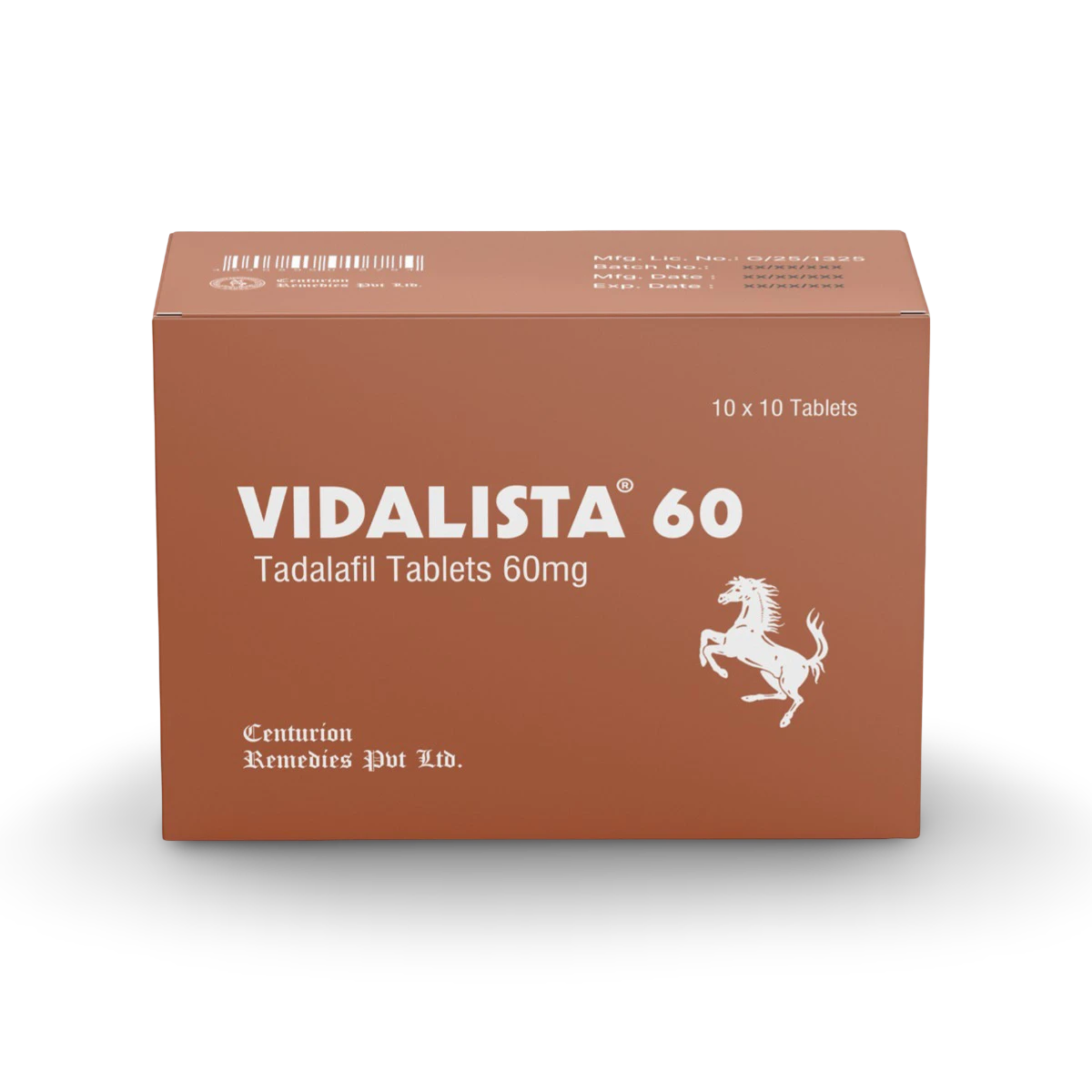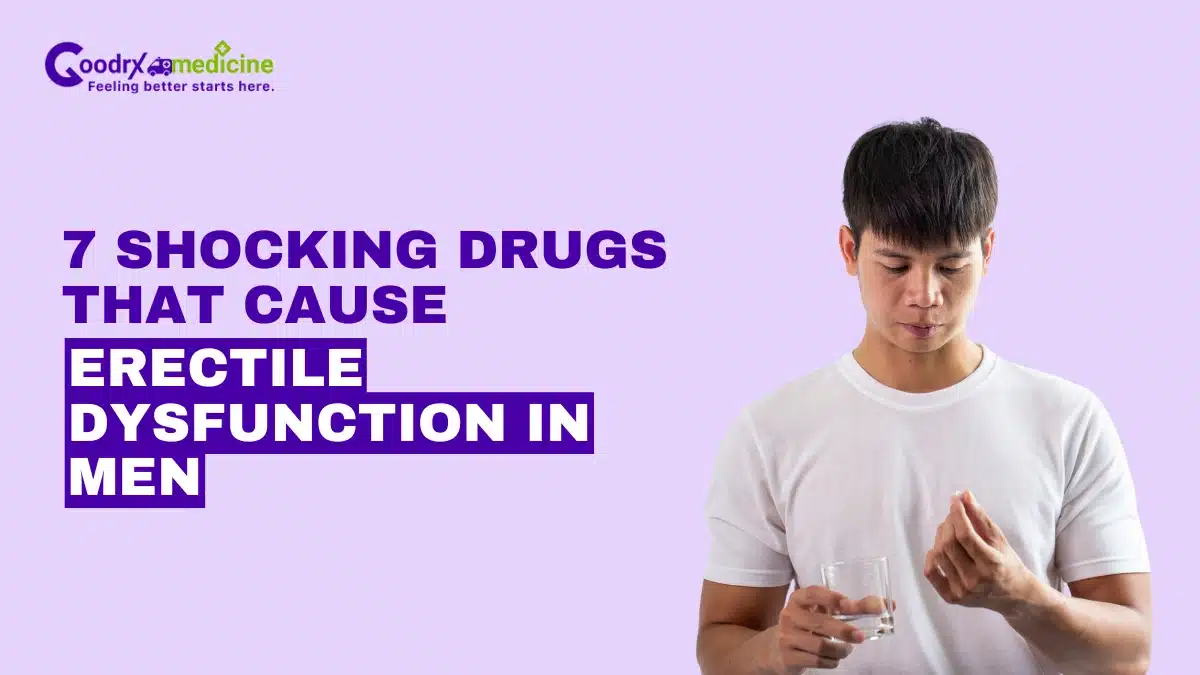Taking medications for health conditions is often necessary, but some can come with surprising side effects, especially in the bedroom.
Many men are unaware that common prescriptions, such as beta-blockers, Selective Serotonin Reuptake Inhibitors or SSRIs, diuretics, and even some antihistamines, are among the drugs that cause Erectile Dysfunction or ED.
These medications can interfere with blood flow, hormone levels, or nerve function, quietly affecting sexual performance over time. If you have noticed changes in your intimate life, your current medications might play a role.
The good news? There are often safer alternatives or adjustments that your doctor can help you make. Read on to discover which drugs may be causing ED and what you can do about it.
1. Antidepressants and Anxiety medications
Mental health is crucial, but many psychiatric medications can affect your sex life. Most antidepressants work by changing brain chemicals called neurotransmitters, which also play a role in sexual desire and function.
Antidepressants like Prozac, Zoloft, and Paxil are particularly known for causing sexual side effects. These medications can reduce your interest in sex and make it harder to reach orgasm or maintain an erection.
Older antidepressants called tricyclics, such as Amitriptyline, also commonly cause sexual problems. Even anti-anxiety medications like Valium and Xanax can interfere with sexual performance by affecting the nervous system.
Save up to 90% on your medicine bills

Cenforce 100 mg

Cenforce 200 mg

Kamagra Oral Jelly Rx 100 mg

Vidalista 60 mg
2. Heart and blood pressure drugs that cause Erectile Dysfunction
Many men take medications to control High Blood Pressure or heart problems. Unfortunately, some of these medicines can make it harder to get or maintain an erection.
Water pills, also called diuretics, are often the first treatment doctors prescribe for High Blood Pressure. Diuretics like Hydrochlorothiazide can affect hormone levels and reduce blood flow to the penis.
Beta-blockers such as Propranolol (Inderal) and Metoprolol (Lopressor) work by slowing your heart rate and reducing blood pressure. However, they can also reduce blood flow to other parts of your body, including the penis.
3. Pain medications and opioids
Long-term use of pain medicines, especially opioids, can significantly impact sexual function. The list of prescription drugs that cause Erectile Dysfunction includes common painkillers like Oxycodone (OxyContin), Morphine, and Codeine.
These medications work by blocking or obstructing pain signals in your brain, but they also interfere with hormones that control sexual function. Extended use can lower Testosterone levels, reduce sexual desire, and make erections more difficult.
Even short-term use of strong pain medications can temporarily affect your sexual performance. The effects might continue for several weeks after you stop taking the medication, depending on how long you used it.
4. OTC drugs that cause Erectile Dysfunction
You might be surprised to learn that some over-the-counter or OTC medications can affect sexual function. Common allergy medications like Diphenhydramine (Benadryl) and Dimenhydrinate (Dramamine) can interfere with nerve signals needed for normal sexual function.
Heartburn medications such as Cimetidine (Tagamet) and Ranitidine (Zantac), when used regularly, can also cause problems. These drugs affect hormone production and can reduce sexual performance over time.
5. Prostate and hormone medications
Men’s health medications can sometimes create unexpected sexual side effects that persist long after treatment stops.
Finasteride (Propecia, Proscar), prescribed for hair loss and an enlarged prostate, has been reported to cause Erectile Dysfunction in about 1.3% of users. This medication blocks DHT hormone production, which can significantly reduce sexual desire and erectile function even months after discontinuing use.
Dutasteride (Avodart) works similarly for prostate conditions but has even more potent effects on hormone levels. Some men report persistent sexual problems that don’t improve after stopping these medications.
6. Chemotherapy and specialty medications
Cancer treatments and certain hormonal medications can significantly impair sexual function through multiple pathways and lead to ED.
Chemotherapy agents such as Cyclophosphamide (Cytoxan) and Busulfan (Myleran) may damage reproductive tissues and disrupt hormone production, leading to reduced libido and erectile difficulties. Recovery can take months or even years; some effects may be irreversible.
Hormonal therapies, including Antiandrogens like Flutamide, Bicalutamide (Casodex), and Nilutamide, are specifically designed to block male hormones, causing immediate and profound sexual side effects.
Other medicines, such as Ketoconazole and LHRH agonists or antagonists (e.g., Lupron, Zoladex, Firmagon), further suppress Testosterone, compounding sexual dysfunction throughout treatment.
7. Illicit drugs and recreational substances
Recreational drug use can severely damage sexual function through multiple mechanisms that often cause permanent problems.
Illegal drugs that cause Erectile Dysfunction include Cocaine and Marijuana, which damage blood vessels and reduce blood flow to the penis. Regular cocaine use can cause lasting vascular damage that doesn’t improve even after stopping.
Marijuana affects the nervous system and hormone production. Chronic cannabis use lowers Testosterone levels and can reduce sexual desire and erectile function significantly.
Methamphetamine and amphetamines initially may seem to enhance sexual experience, but regular use destroys blood vessels and nerve pathways essential for normal sexual function. Recovery can take months or years.
Alcohol, while legal, acts as a depressant that impairs nerve signals needed for erections and causes ED. Chronic alcohol abuse can cause permanent nerve damage and hormone disruption, affecting sexual performance.
What to avoid and safer medication options
Making wise medication choices can protect your sexual health while still treating your medical conditions effectively. Here are key strategies to discuss with your healthcare provider:
- Request medication reviews: Ask your doctor to evaluate all your prescriptions together, as a combination of drugs that cause Erectile Dysfunction often creates worse problems than single medications.
- Consider timing adjustments: Some medications cause fewer sexual side effects when taken at different times of day or with modified dosing schedules under medical guidance.
- Monitor and document symptoms: Keep track of when sexual problems started, including medication changes, as this helps doctors identify problematic drugs more easily.
- Switch from thiazide diuretics to ACE inhibitors or Angiotensin II Receptor Blockers (ARBs): These blood pressure medications are equally effective but cause fewer sexual side effects than water pills like Hydrochlorothiazide.
- Choose Calcium Channel Blockers (CCBs) over beta-blockers: Medications like amlodipine control blood pressure without significantly reducing blood flow to sexual organs, unlike propranolol or metoprolol.
- Consider Wellbutrin instead of SSRIs for Depression: This antidepressant improves sexual function in many people, unlike Prozac, Zoloft, or Paxil, which commonly cause sexual problems.
- Avoid combining multiple problematic medications: Taking several drugs that cause Erectile Dysfunction together multiplies your risk, so work with your doctor to minimise the total number when possible.
Conclusion
Many prescription and over the counter medications can interfere with sexual function, but understanding specific drugs that cause Erectile Dysfunction helps you make better treatment choices.
Thiazide diuretics like Hydrochlorothiazide and beta-blockers such as Propranolol are among the worst offenders for blood pressure control, while SSRI antidepressants, including Sertraline and Fluoxetine, commonly cause sexual problems.
Opioid pain medications like Oxycodone and Morphine significantly reduce Testosterone production, and prostate medications such as Finasteride can cause persistent sexual dysfunction.
Even over-the-counter drugs like Diphenhydramine and Cimetidine can interfere with sexual performance. The most crucial step is discussing these medication effects openly with your healthcare provider to explore alternatives like ACE inhibitors for blood pressure, Bupropion for Depression, or adjusting dosing schedules to minimise sexual impact while maintaining effective treatment of your medical conditions.

Frequently Asked Questions
Do all men experience sexual side effects from these medications?
No. Individual reactions vary widely; some men tolerate medications without any sexual side effects, while others experience issues immediately. Age, overall health, dosage, and other medications influence your risk. If you notice symptoms, discuss alternatives or dose adjustments with your healthcare provider to find a suitable option.
Can lifestyle changes help offset medication-related Erectile Dysfunction?
Yes. Regular exercise, maintaining a healthy weight, reducing alcohol, quitting smoking, and managing stress can improve blood flow and hormone balance, helping offset ED linked to medications. While lifestyle shifts boost sexual function, you may still need to review your prescriptions with a doctor for an effective treatment plan.
Will switching to generic versions of medications help with sexual side effects?
No. Generic versions have the same active ingredients as brand-name versions, so sexual side effects usually remain unchanged. However, different inactive fillers or dyes some manufacturers use may affect tolerance or cause mild side effects. Always talk to your doctor if you notice new or worsening symptoms.
Can herbal supplements help counteract medication-induced Erectile Dysfunction?
Yes. Certain herbal supplements like ginseng or L-arginine may help improve blood flow and sexual function, but they can interact with prescription drugs and cause side effects. Always check with your healthcare provider before starting any herbal remedy to ensure safety and avoid dangerous interactions with your medications.
When referencing outside resources, GoodrxMedicine always provides full citations. To learn more about the measures we use to maintain the quality of our content, please review our Content Information Policy.











